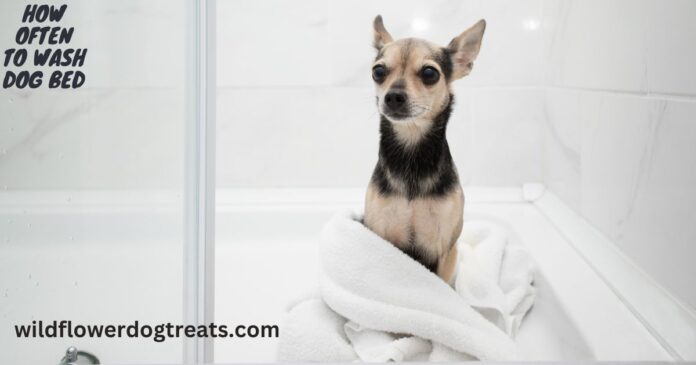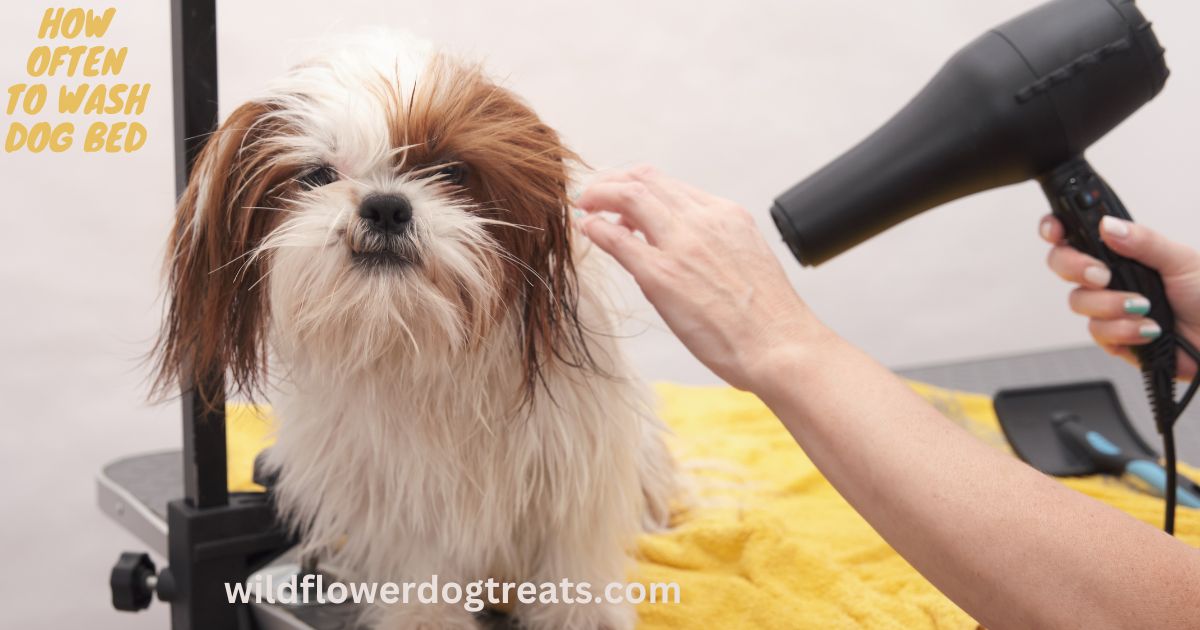You should wash your dog’s bed once a week to maintain hygiene and prevent bad smells. how often to wash dog bed. Regular washing can help keep your pet healthy and comfortable.
Are you a pet owner wondering how often you should wash your dog’s bed? Just like humans, pets need clean bedding to stay healthy and comfortable. By maintaining a regular washing schedule for your dog’s bed, you can prevent the buildup of dirt, allergens, and bacteria, which can help avoid skin irritations, odors, and other health issues.
We’ll explore the importance of keeping your dog’s bed clean, how often to wash it, and tips for effectively cleaning your furry friend’s sleeping area. Keep reading to ensure your pet can rest in a fresh and clean environment!
Importance Of Cleanliness For Your Dog’s Health
Providing a clean and hygienic environment for your dog is essential for maintaining their overall health and well-being. Just like us, dogs require a clean living space to prevent the accumulation of bacteria and allergens that can lead to various health issues. One crucial aspect of maintaining cleanliness for your furry friend is regular cleaning of their bedding. Let’s delve into the impact of bacteria build-up, as well as the connection between cleanliness and allergies and skin conditions for dogs.
Impact Of Bacteria Build-up
Bacteria can proliferate quickly in unwashed dog bedding, posing a threat to your dog’s health. Regular washing of your dog’s bed can help eliminate harmful bacteria and pathogens that may cause gastrointestinal and skin infections. By keeping your dog’s bedding clean, you can create a healthier environment that supports your pet’s well-being.
Allergies And Skin Conditions
A neglected dog bed can be a breeding ground for allergens such as dust mites, pet dander, and pollen, which may exacerbate allergies and skin conditions in dogs. Washing your dog’s bed regularly helps reduce the buildup of these allergens, providing relief for dogs prone to allergies and skin irritations. This simple practice can contribute to your pet’s comfort and overall health.
How Often Should You Wash Your Dog’s Bed
As a responsible pet owner, ensuring your dog’s bedding is clean is essential for their health and comfort. But how often should you wash your dog’s bed? Let’s delve into some guidelines to help you maintain a clean and hygienic sleeping area for your furry friend.
Weekly Cleaning
Regular maintenance and cleaning of your dog’s bed can make a significant difference in their well-being. Washing your dog’s bed weekly is generally recommended to eliminate dirt, bacteria, and odors that may accumulate over time. Just like our own bedding, pet bedding needs frequent washing to remove allergens and prevent the growth of harmful microorganisms. Regular cleaning can also help to extend the lifespan of the bed.
Usage Patterns And Environmental Factors
Several factors can influence how often you need to wash your dog’s bed. Usage patterns and environmental factors such as shedding, outdoor activities, and potential exposure to pests can warrant more frequent cleaning. Additionally, if your dog has skin sensitivities or allergies, regular washing of the bed becomes even more crucial to maintain a clean and comfortable sleeping environment for them.
Best Practices For Washing Your Dog’s Bed
Keeping your dog’s bed clean is essential for their health and well-being. Regular washing not only helps to maintain hygiene but also eliminates odors and prevents the buildup of allergens. Here are some best practices for washing your dog’s bed:
Machine Washing And Drying
When it comes to washing your dog’s bed, machine washing is a convenient and effective method. Follow these steps for best results:
- Remove the cover and any removable parts from the bed.
- Check the care label for washing instructions and recommended water temperature.
- Use a pet-safe detergent and wash the bed on a gentle cycle with warm water to effectively remove dirt and pet odors.
- Dry the bed thoroughly in a dryer or air-dry it in sunlight to ensure that no moisture is trapped inside the bed.
Natural Cleaning Tips
For a more natural and eco-friendly approach to cleaning your dog’s bed, consider the following natural cleaning tips:
- Baking soda: Sprinkle baking soda on the bed to neutralize odors and absorb moisture before vacuuming it off.
- White vinegar: Adding white vinegar to the wash cycle can help eliminate pet odors and sanitize the bed fabric.
- Sunlight: Sunlight acts as a natural disinfectant and deodorizer, so air-dry the bed outdoors on a sunny day when possible.
Ensuring Longevity And Comfort For Your Dog
Your dog’s bed is more than just a place to sleep; it’s a sanctuary, a space that provides comfort and security. To ensure your furry companion’s well-being, it’s crucial to maintain the hygiene and quality of their bed. Regular cleaning and proper maintenance not only promote a healthy environment for your pet but also contribute to extending the lifespan of the bed. Here, we delve into the optimal frequency for washing your dog’s bed and essential maintenance practices, aiming to keep your pet happy and healthy.
Replacement Frequency
Ensuring a clean and comfortable sleeping area for your dog involves not only regular washing but also knowing when it’s time to replace their bed. The average lifespan of a dog bed ranges from one to two years. However, for heavily used or damaged beds, replacement may be necessary sooner. Keep an eye on signs of wear, such as flattened padding, frayed fabric, or persistent odors that cannot be eliminated through washing. Additionally, if your pet has frequent accidents or exhibits chewing behavior, consider opting for a more durable and resilient bed to accommodate their needs.
Maintenance For A Healthy Dog
Beyond washing the bed, maintaining its cleanliness and integrity is essential for your dog’s well-being. Regular vacuuming can help remove loose hair, dirt, and dander, preventing the buildup of allergens and unpleasant odors. Spot cleaning with a pet-safe cleaner can address minor stains and spills, promoting a fresh and hygienic sleeping environment for your dog. Furthermore, consider using a washable bed cover or protective liner as an additional barrier against dirt and moisture, allowing for convenient and frequent cleaning without compromising the bed’s comfort and structural integrity.
Frequently Asked Questions Of How Often Should You Wash Your Dogs Bed
How Often Should You Wash Your Dog’s Bed?
It’s recommended to wash your dog’s bed once a week to keep it clean and odor-free. Regular washing helps to keep nasty smells away and maintain your pet’s bedding in top condition. If the bed is particularly dirty or soiled, it’s best to wash it more often.
Is It Ok To Wash Dog Bed In Washing Machine?
Yes, it is OK to wash a dog bed in a washing machine. Many dog beds can be machine washed with detergent and warm or hot water. Additionally, you can add baking soda and/or white vinegar in the wash cycle to prevent odors.
If you’re short on time, spot cleaning with soap and water works well.
How Often Should I Change My Dogs Bed?
You should replace your dog’s bed every two years at most. Cheaper dog beds will generally last a year or less. The lifespan of your dog’s bed will also be shorter if your dog chews on it or has a lot of accidents.
How Often Should You Wash Your Dog’s Comforter?
Your dog’s comforter should be washed once a week to prevent odor and keep it clean. how often to wash dog bed. If it gets dirty more often, wash it more frequently. Using detergent with warm or hot water can effectively clean the comforter. Consider spot cleaning with soap and water if you’re short on time.
Conclusion
To keep your furry friend healthy and comfy, it’s crucial to wash their bed once a week. This practice helps to ward off dirt, allergens, and unwanted smells. Remember, your pet’s hygiene is just as vital as your own. Make it a habit to maintain a clean and cozy space for your beloved dog.




